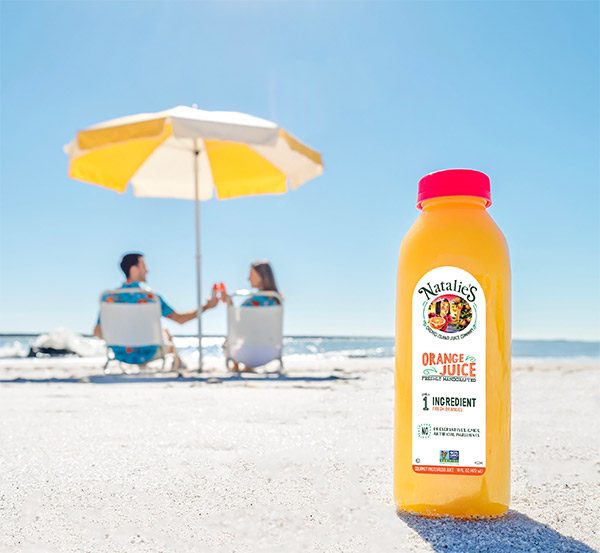Natalie’s Featured on BevNET
Solving a Pressing Problem: How HPP Companies Face Down Food Waste
Date: May 25th, 2016For J.C. Hanley, the co-founder and COO of San Francisco-based cold pressed juice company Forager Project, paying to compost the leftover byproduct from the juice making process was never as much of financial burden as it was an emotional one.
“We had all this beautiful organic vegetable puree and we just thought “This isn’t waste. There’s got to be a better way. We’ve got to be able to use this,” says Hanley. “If we were a food company, this would be our product and the juice would be the waste. So we got to thinking about how we could be more sustainable and efficient.”
Hanley’s passion for his leftover juice pulp would make way for Forager Project to, in fact, become a food company — as well as a cold-pressed juice brand. At the start of 2016 Forager Project introduced a new line of vegetable chips, combining fresh pressed vegetable pulp left over from its juice production and sprouted grains. Available in Greens, Roots, and Beet varieties, the snacks are organic, non-GMO, gluten-free, kosher, vegan and corn-free.
As the category of high pressure processed (HPP) juices continue to grow, companies have done strong work utilizing more of their fruit and vegetables’ flesh and rind than ever before. But they also crush massive amounts of the stuff, which means that no matter how well they press, there’s still going to be something left over. So creative re-use is starting to rule the day.
Austin-based high pressure processed (HPP) juice company Daily Greens has found ways to repurpose its juice pulp as well. Since the company’s launch in 2012, founder and CEO Shauna Martin has made it a priority to ensure that leftover juice pulp avoided the landfill, composting the majority of it before having it sent to a local worm farm where it’s later repackaged and sold as gardening soil. But in 2015, Martin began looking for ways to upcycle some of the leftover juice pumice, the result of which was the 2015 launch of Daily Greens’ “Half Pint” smoothie line, in which a portion of leftover pulp has been reused to add fiber.
She’s not done yet.
“We’ve also recently been in talks with a number of pet foods manufacturers as people are realizing pets needs greens — and our byproduct is an amazing source of organic greens,” Martin revealed.
Such sustainability doesn’t always come easy. Category leader Suja attempted to repurpose its pulp for use in its recently launched line of probiotic waters, but eventually turned away from the ingredient.
When looking to scale the line, Suja “encountered challenges achieving our high taste and consistency standards with repressed pumice,” according to a statement from the company. Suja has since returned to using fresh-pressed fruits and vegetables for the probiotic water line as the company “works on a solve to get back to re-pressed pumice.”
Like Suja, which donates all leftover juice pulp to local farms, Boston-based maple water brand DRINKmaple is doing the same upon production of its recently introducedDRINKmelon, an organic juice line extension made from domestically sourced watermelons. According to the company, Drinkmaple will give the left-over watermelon rinds and pulp to farms, where it will be used as organic animal feed. Similarly, Natalie’s Orchid Island Juice Company is feeding the Sunshine State cows with the residual raw fruit peels left over from its production process.
In December of 2015, Baldor Specialty Foods, a leading distributor of produce and specialty foods in the Northeast, announced its SparCs program, an initiative designed to combat food waste by repurposing its leftover produce – from its Bronx, New York manufacturing facility. The launch of SparCs led to a partnership with Washington, D.C. cold-pressed juice companyMISFIT Juicery, which has been making juice products from leftover Baldor produce, including strawberry tops, carrot peels, and watermelon pieces. Baldor is also now serving as a distributor for MISFIT.
Thomas McQuillan, a business analyst at Baldor who is leading the company’s sustainability initiative, told BevNET the SparCs program has also been looking at ways to repurpose its produce in animal feed and energy from anaerobic digestion, along with repurposing the food for human consumption.
“We had this viable food product without a traditional channel for distribution but we still knew it was useful to the market,” said McQuillan. “We felt it would be irresponsible for us to not find a way to get that to a user, whether it be a human or animal.”
The other factor, McQuillan notes, is a new regulation requiring food processing facilities larger than 20,000 square feet to no longer use landfills for organic matter.
“We’re answering that call as well,” McQuillan added. “This kind of solution is something that resonates really well in the marketplace today. People want to have access to products that are part of a solution to fix this epidemic we call food waste in the United States.”
Article by: NEIL MARTINEZ-BELKIN – MAY 25, 2016
Read the full article at BevNET.com


